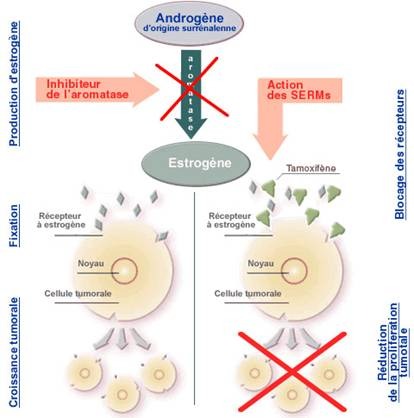Published on
Updated
Reading 2 min.
in collaboration with
Claire Bonneau (Surgeon)
Affected by breast cancer, Caroline Receveur continues her treatment. She announces that she will now benefit from hormone therapy. What does it consist of ? How does this treatment induce menopause? Explanations from Dr Claire Bonneau, lecturer at Versailles Saint-Quentin University and surgeon at the Institut Curie in Saint-Cloud.
Caroline Receveur, affected by breast cancer, continues her treatment. She announced to her fans that she would have to change her preventive treatment and benefit from immunotherapy for a year. At the same time, she also explains that she is going to follow hormone therapy, which risks putting her “into menopause”.
What does this treatment consist of? Explanations from Dr Claire Bonneau, lecturer at Versailles Saint-Quentin University and surgeon at the Institut Curie in Saint-Cloud.
No permanent menopause
“In the case of a young woman, not menopausal but affected by breast cancer, we will generally give Tamoxifen” first explains the specialist. “This treatment will not lead to definitive menopause for the patient, who will be able to regain normal cycles and fertility at the end of treatment.
Why give this hormone therapy?
Tamoxifen is a preventive treatment to avoid recurrence of cancer linked to circulating cells. “It prevents circulating cancer cells, which escape curative treatments, from attaching elsewhere in the body and metastasizing, to the lung or bone marrow for example. adds Dr Claire Bonneau.
Hundreds of thousands of women around the world take tamoxifen to prevent a recurrence after surgery for early-stage breast cancer. Tamoxifen is effective only in women with hormone-dependent tumors (whose growth is encouraged by hormones), and most of them take it immediately after their initial surgery or chemotherapy. Another class is also prescribed in this indication: anti-aromatases (such as Arimidex® and Femara®).
Numerous studies have shown that taking tamoxifen reduces the death rate from breast cancer over a period of 15 years following diagnosis.

“Tamoxifen can give hot flashesa disturbance of the lipid profile or vaginal discharge but it is beneficial on other levels, such as to fight against osteoporosis” specifies our expert.
Long treatment and early termination if pregnancy is desired
Tamoxifen comes in the form of tablets, to be taken once a day. “It is generally prescribed for 5 years, this can go from seven to ten years in women with greater lymph node involvement.” specifies the expert.
If you want to become pregnant, treatment must be stopped at least nine months before it begins. “This is linked to its effect on the ovaries which lasts nine months. To avoid any risk of genetic anomaly, it is imperative that the treatment has been stopped for at least nine months before trying to have a child” explains Dr. Bonneau again.
What if Tamoxifen is poorly tolerated? “Tamoxifen is rather well tolerated. But if this is not the case, it is possible to stop the treatment and the effects will disappear immediately. However, it will be necessary to adapt a new treatment, with your oncologist. she concludes.
